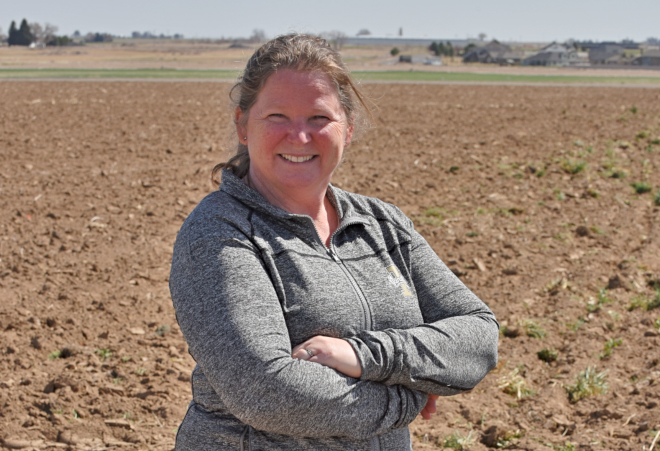
Nora Olsen named 2021 Spudwoman of the Year
Just saying North American potato production has benefited from the efforts of Nora Olsen would be an understatement.
Over the past two-plus decades, the University of Idaho (UI) professor and Extension specialist has led or contributed to a plethora of research projects that have improved growing and storage practices, not just in North America, but around the world. Olsen is one of the industry’s leaders in outreach of new research knowledge, but her drive to engage the industry goes well beyond just sharing her own research. It also lends itself to the numerous organizations of which she’s a part of, including the Potato Association of America and World Potato Congress, among others.
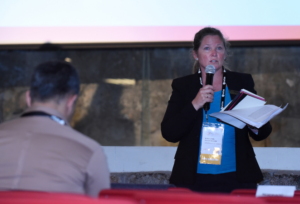
For her continued dedication to the potato industry, Nora Olsen is the 2021 winner of the Spudwoman of the Year award sponsored by Lockwood Potato Equipment.
“She is the queen of potatoes, especially related to storage,” said Silvia Rondon, Oregon State University professor and Extension entomologist specialist. “I have had the chance to travel abroad and am amazed by the impact of her work in other countries.
“She is a role model.”
Fellow University of Idaho professor and Extension specialist Mike Thornton, who has worked with Olsen on many projects, said her mental database of people in the research community and ability to lead are unmatched.
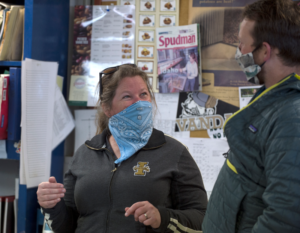
“She is a tremendous team builder. She spends a lot of time getting to know people throughout the industry, understands their talents and abilities, and then finds ways to put them in situations where they can be successful,” Thornton said. “I call it networking with a purpose, and she does it better than anyone else I have ever met.”
“That ability, and the fact that she cares so deeply about the potato industry and the people that work in it, has really made her a go-to resource that people turn to when they have a problem that needs to be solved. I’m not just talking about just on a local or regional level, she has that kind of reputation both nationally and internationally as evidenced by her contributions to many national research and Extension projects and service on the board of directors of the World Potato Congress.”
Following the science
Olsen did not grow up on a farm, but she was never far from agriculture, both literally — she grew up in Eastern Washington — as well as figuratively; her mother grew up on a farm.
“It just so happened that my family didn’t farm, but I was never far away from that,” she said. “I was always science-based and knew that I wanted to study science. I just needed an application. I wanted it to be a direct contribution. I wanted to be in those front lines, dealing with people and helping to solve problems.”
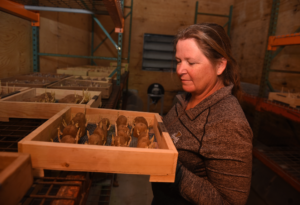
After four years of undergrad college on the East Coast, Olsen enrolled in a master’s program at Washington State. “They have this fabulous horticulture program, but specifically a really great potato program,” she said. “I was so fortunate to work with people like Bob Thornton and Larry Hiller and some of the greatest potato research and Extension people, and that got me really into potatoes.”
At the same time, Olsen’s brother, Brent, a non-farmer, opted to start growing crops, including potatoes. Brent became something of a guinea pig, which led to Nora’s quick realization that research works great in ideal situations, but situations are rarely ideal in real-world farming.
“I’d make a recommendation and he’d say, ‘OK, but with what money am I going to buy that equipment?’” Olsen recalled. “So, that experience helped put things in perspective and taught me very early on that not everything is textbook and goes perfectly like we plan.”
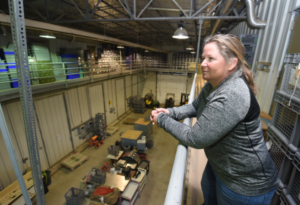
One of Olsen’s early projects dealt with studying internal brown spot, which set her on a path of focusing on maintaining optimal quality in potatoes. Eventually, she arrived at quality during the final leg of the production cycle for many potatoes, which is their time in storage bins, which can be for more than six months in some cases. Her interest in storage was boosted by the fact that UI’s Kimberly Research Center — Olsen’s home base — has a top-notch facility dedicated to storage research.
When asked about the importance of potato storage, Olsen quoted agronomist Addie Waxman, formerly of 1,4GROUP and now with McCain Foods.
“Addie Waxman said recently, ‘We have to put it in a different perspective. We actually store these potatoes longer than they’re out in the field,’” Olsen said. “‘How are we going to maintain that quality so we have potatoes year-round?’”
Notable projects
Olsen’s research projects over the past 30 years are plentiful and wide ranging, but one thing she has been widely recognized for is her work with phosphorous acid to mitigate diseases post-harvest.
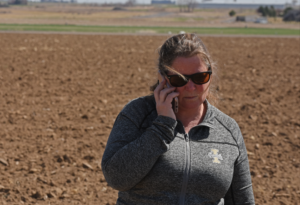
“Dr. Olsen was a pioneer in the development of the use of phosphorous acid products in storage to manage pink rot, late blight and silver scurf,” said Jeff Miller, a former UI researcher who now runs Miller Research in Rupert, Idaho. “Nora has always conducted world-class research and Extension that have yielded practical, applicable management practices.”
A couple of other things Olsen cited as especially fulfilling were CIPC alternatives to sprout inhibiting and research on identification of bruise.
“We worked on (CIPC) for many, many years looking at mint oil, smart block and these other alternatives in how we might be able to put these together and integrate to reduce CIPC inputs,” Olsen said. “It was gratifying because I got to collaborate with a lot of people, and it was because we had to answer so many questions, whether there was going to be corrosion issues with any of these sprout-inhibitors or if there were going to be any taste or fry color issues. We were very pleased with that project. It was about a 20-year project.”
On bruise: “That’s always going to be an issue in the industry, but looking at how early you can identify blackspot bruise can allow you to make adjustments or modifications faster to reduce it. You no longer need to wait 24 hours to get a good look at what’s happening with your potatoes, you can get some good information in just a few hours.”
A people person
Olsen is a sought-after speaker at seminars and conferences not just for her vast knowledge, but because she has an engaging style, both in terms of speaking and presentation.
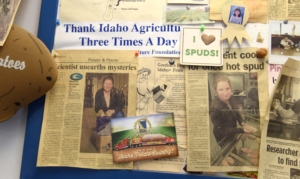
“Nora is one of the most entertaining speakers,” said Rondon. “She is creative in her research activities and also in her delivery format.
“She can convert a boring topic into something that is worth listening to.”
While the pandemic has canceled many in-person events, Olsen’s demand and involvement hasn’t waned, as she has become a popular contributor for potato-focused webinars, including World Potato Congress webinars, of which she’s the permanent host.
“She has been a great source of knowledge for growers throughout the world and that has made her a highly sought speaker,” Miller said. “Nora is also a great person to work with and be around. She is a great scientist and friend.”
Olsen is outwardly enthusiastic and outgoing, but that doesn’t fully explain why she is involved in so many associations, events and projects. Olsen wants to talk to as many people as she can because, whether you’re a farmer in Idaho or a researcher in Australia, she knows she can learn something from you.

“I have a-ha moments almost every day, it seems, whether it’s from a grower or a colleague somewhere else,” she said.
Thornton, an accomplished researcher in his own right, said Olsen is the first person he turns to for anything to do with storage and added that her overall breadth of potato expertise is among the best.
“As a colleague, she is a joy to work with,” Thornton said. “Always positive, always willing to contribute and do her part, and always bringing up new ideas. Her knowledge and technical expertise are world-class.”
Spudwoman of the Year supporter Lockwood Potato Equipment and parent company Crary Industries offered congratulations.
“Lockwood would like to congratulate Dr. Nora Olsen for being selected as Spudwoman of the Year,” said Dan Birrenkott, President, Crary Industries. “Dr. Olsen’s credentials for this award are so vast they are almost innumerable. Her achievements as an educator, mentor, speaker, lecturer, researcher, and featured Spudman contributor display just a fraction of the overall impact she has made on the advancement of the potato industry.”
The Nora Olsen Nelson File
-
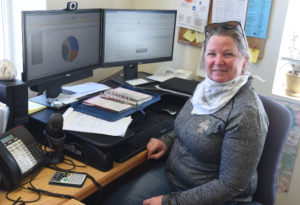
Nora Olsen at her office in Kimberly, Idaho. Photo: Bill Schaefer Photography Job: Professor and Extension specialist, Kimberly Research and Extension Center, University of Idaho
- Hometown: Spokane, Washington
- Family: Husband Matt Nelson, daughters Ruth Nelson and Lena Nelson and two Australian shepherds, Blue and Skye. (Olsen also has a niece named Nora, who is hoping to become a scientist.)
- Education: Ph.D. and master’s degree from Washington State University; bachelor’s degree from Connecticut College
- Organizations: Olsen is a member of the Potato Association of America (PAA) and has served on its board of directors. She was the first female to serve as PAA president in 2013. Also, Olsen works closely with the World Potato Congress, Idaho Potato Conference and has served on the Idaho Zebra Chip Advisory Committee, Bacterial Ring Rot Task Force and many other potato- or agricultural-driven organizations. She’s won numerous awards, including the PAA’s Outstanding Extension Project Award in 2013, University of Idaho’s Excellence in Outreach & Extension Award in 2011-12 and received special recognition from the Idaho Potato Commission in 2005.
- Hobbies: “My dogs, gardening, hiking, skiing and enjoying the great Idaho outdoors.”
- Favorite way to eat potatoes: “Of course I like them in all formats, but if I had to say one way, I’d say roasted because it’s really an ode to the potato’s versatility. You can cut or slice it in any shape or direction to make fries, wedges, chips or whatever, but it’s still roasted all the same”
MORE PHOTOS: 2021 Spudwoman of the Year Nora Olsen
Spudwoman of the Year past winners
2020: Britt Raybould, Raybould Brothers Farms
2019: Alison Sklarczyk, Sklarczyk Seed Farms
2018: Melanie Wickham, Empire Potato Growers
2017: Addie Waxman, 1,4GROUP (now with McCain Foods)
Top Photo: Bill Schaefer Photography














